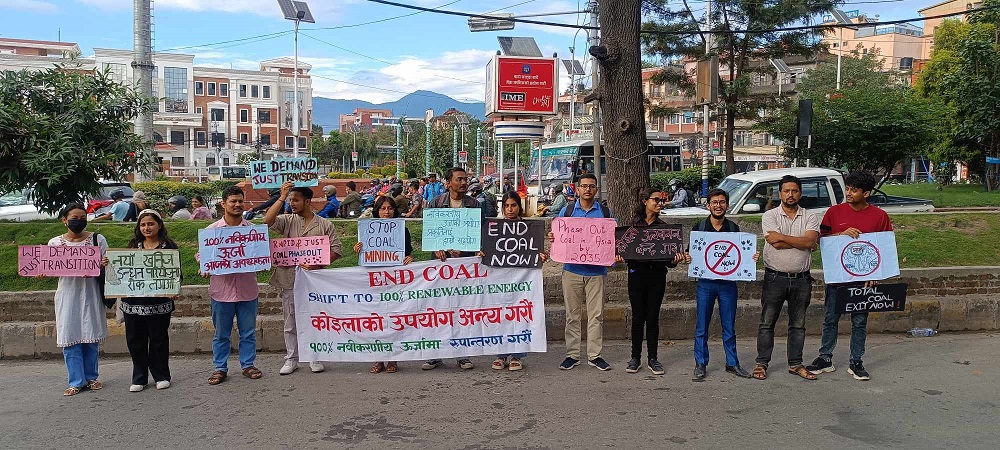
Global Day of Action to End Coal: Nepalese Climate Activists Call for Fast and Fair Coal Phase-Out
On September 13, 2024, Nepalese climate activists, including farmers, youths, indigenous groups, and marginalized communities, gathered at Maitighar Mandala to demand a rapid phase-out of coal. This demonstration was part of a global movement that took place in 72 cities across nine countries, including the Philippines, Japan, Indonesia, Thailand, Bangladesh, Pakistan, Sri Lanka, and India. The aim is to accelerate the global transition from fossil fuels and push developed nations to fulfill their climate finance obligations ahead of major climate summits, such as the United Nations Summit of the Future and COP29.
Key Demands from Climate Activists
-
Phasing Out Coal: Coal contributes to 48% of industrial consumption in Nepal, largely in cement and brick factories. Activists stress the urgent need to shift toward renewable energy and ensure a fair transition for workers affected by the coal industry’s decline.
-
Immediate Action: Despite global agreements, new coal projects are increasing. Activists are calling for immediate cessation of coal expansion in Asia, where coal-fired plants are harming communities by polluting land, air, and water, and deepening inequalities in the Global South.
Challenges to Transitioning Away from Coal
Wealthier nations continue to finance coal projects despite commitments to reduce fossil fuel use. According to Biplov Swarnakar, even as coal industries shrink in the Global North, countries like the US, UK, and Canada are financing new coal infrastructure in Asia. This expansion contradicts their public stance on reducing emissions domestically.
UN Summit for Global Cooperation
The UN Summit of the Future, scheduled for September 22-23, is expected to address global cooperation on climate change. The Pact for the Future seeks to reignite commitments to transitioning away from fossil fuels. The COP28 Climate Summit in Dubai will also focus on helping nations phase out coal and other fossil fuels, a decision already endorsed by nearly 200 nations.
Financial Support for Coal Projects
Major banks from developed countries continue to finance coal, even as they publicly commit to climate action. Between January 2021 and December 2023, commercial banks provided $470 billion in loans and underwriting to the coal sector, despite the clear environmental and economic risks.
Global Coal Use and Production Trends
While coal production slowed after the 2015 Paris Agreement, it rebounded sharply by 2023, driven by rising demand in Asia. Countries like India and China are increasing their coal capacity, making it challenging to meet global climate goals. Experts estimate that phasing out coal will require an annual retirement of 126 GW of coal power until 2040, equal to shutting down two coal plants every week.
Renewable Energy as a Viable Solution
Activists emphasize that renewable energy has become the most affordable source of electricity, especially in Asia. By reallocating fossil fuel subsidies and investing in clean energy, countries in the Global South could benefit from improved access to sustainable power.
Stranded Assets in the Coal Industry
The global shift towards renewables poses a significant financial risk to coal developers, with billions in stranded assets likely as coal becomes less competitive. According to the International Energy Agency (IEA), 96% of new solar and wind installations in 2023 generated electricity at lower costs than new coal and gas plants. This trend is expected to continue, making renewable energy the more cost-effective option worldwide.
Conclusion
Nepal and other Asian nations are facing critical decisions about the future of coal. Activists are pushing for a fast, fair, and globally funded coal phase-out to mitigate the devastating effects of climate change. As coal use rises in Asia, so does the urgency to shift to cleaner, more sustainable energy solutions. The upcoming climate summits offer a crucial opportunity for world leaders to take meaningful action to end reliance on coal and transition to a renewable energy future.





